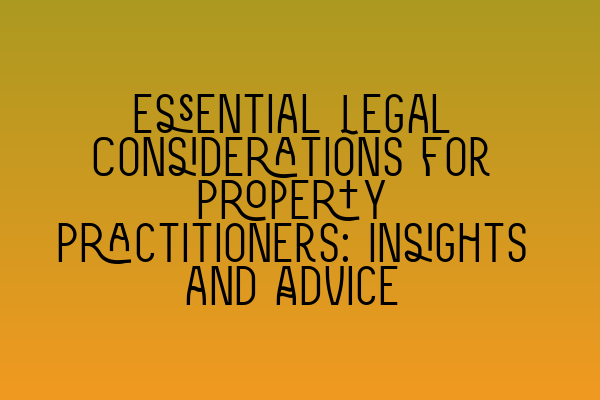Essential Legal Considerations for Property Practitioners: Insights and Advice
As a property practitioner, it is crucial to have a solid understanding of the legal considerations that arise in property law and land law. These considerations not only protect your clients’ interests but also ensure that you are compliant with the regulations and laws in your area of practice. In this blog post, we will explore some essential legal considerations that every property practitioner should be aware of.
1. Title and Ownership
One of the key aspects of property law is establishing and verifying title and ownership. It is crucial to conduct thorough due diligence and investigate the property’s title to ensure that it is clean and free from any encumbrances or disputes. This may involve reviewing historical documents, conducting searches, and interpreting complex legal terminology. SQE 1 Practice Exam Questions
2. Contracts and Agreements
Property transactions involve a range of contracts and agreements, such as leases, purchase agreements, and easements. It is critical to draft these documents carefully, ensuring that they accurately reflect the parties’ intentions and protect their rights. Adequate consideration must be given to key terms such as price, conditions, and warranties. Expertise in contract law is essential to avoid future disputes. SQE 1 Practice Mocks FLK1 FLK2
3. Planning and Development
In property law, planning and development play a significant role. Understanding local zoning regulations, planning permissions, and building codes is crucial when advising clients on development projects. This involves assessing planning applications, negotiating with local authorities, and ensuring compliance with environmental regulations. SQE 2 Preparation Courses
4. Financing and Mortgages
Financial considerations are paramount in property transactions. Property practitioners must have a comprehensive understanding of financing options and mortgages available to their clients. This involves advising on loan agreements, mortgage terms, and potentially negotiating more favorable terms for the client. Familiarity with financial regulations and lending practices is essential to provide effective advice. SQE 1 Preparation Courses
5. Landlord and Tenant Law
Landlord and tenant relationships are governed by specific laws and regulations. Property practitioners should have a solid understanding of these laws, including lease agreements, eviction procedures, and tenants’ rights. It is important to advise both landlords and tenants on their rights and responsibilities and assist in resolving any disputes that may arise. SRA SQE Exam Dates
6. Dispute Resolution
Disputes can arise in property law, and property practitioners must be skilled in dispute resolution. This may involve negotiation, mediation, or representation in court. Understanding the legal principles involved in property disputes and having strong advocacy skills can help ensure the best possible outcome for clients.
These are just a few essential legal considerations for property practitioners. As the field of property law is vast and ever-evolving, ongoing professional development and staying up to date with changes in legislation and case law is crucial for success.
At SQE Property Law & Land Law, we offer comprehensive courses and training to help property practitioners enhance their legal knowledge and skills. Whether you are preparing for the SQE exams or looking to further develop your expertise, our courses provide invaluable insights and practical advice. Contact us today for more information!
